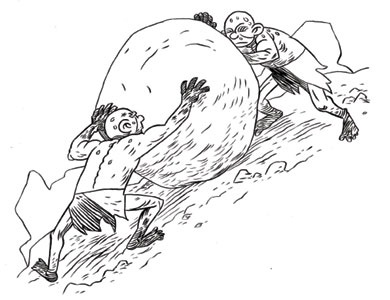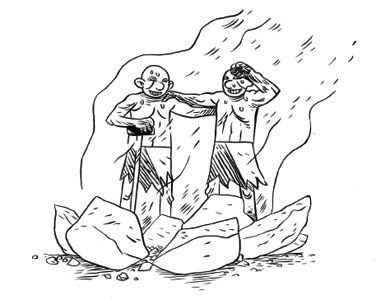by R. Shoalgrass
 It was early Saturday morning the first week of the New Orleans occupation. It was the first morning we had hot coffee at the camp. I was sipping on a cup and having an awkward half-awake chat with my new crush who I met after the first General Assembly when I heard the security report from the night before. “There was a guy masturbating on another guy while he was sleeping.” Hearing of an assault at the camp was heart-breaking enough, but added to that was the discomfort I felt hearing the emphasis that was placed on “another guy.”
It was early Saturday morning the first week of the New Orleans occupation. It was the first morning we had hot coffee at the camp. I was sipping on a cup and having an awkward half-awake chat with my new crush who I met after the first General Assembly when I heard the security report from the night before. “There was a guy masturbating on another guy while he was sleeping.” Hearing of an assault at the camp was heart-breaking enough, but added to that was the discomfort I felt hearing the emphasis that was placed on “another guy.”
The morning meeting started and when the issue of the assault came up, I spoke up and mentioned that whenever there is a male-on-male assault I become concerned about the reaction being framed in a homophobic way, and how that would affect my and other queer people’s comfort in the space. I looked up, and the man who worked security, the one who put the emphasis on “another guy”, was twinkling his fingers in agreement with me. After the meeting he came over and apologized for the way he spoke, introduced himself, told me how much he was learning at the occupation, how it was all very new to him. He spoke with a radical humility, with all defensiveness and ego dropped, and then he gave me a hug.
Hugging another man is pretty much against the rules of our hetero-centric, homophobic society. Hugging a gay man is completely against the rules. By listening, by being self-critical, by expressing a desire to grow, this man stood up against homophobia and patriarchy.
A problem some people have with the occupation is that there isn’t enough action. “The point isn’t to camp in a park,” is one common complaint. While I also am excited to see this movement take bolder steps in confronting systems of power, capital, and inequality, I know that a prerequisite for that is Solidarity. Solidarity is the knowledge that the people we are with have each others’ backs, not just against a police line, but at work, at a picnic, on the street corner, and over morning coffee. Solidarity is the antithesis of the alienated life handed to us in late-capitalist society. It is the antithesis of walking by people on the street and never stopping to find out about their lives and struggles and joys. It is the antithesis of politely and quietly ignoring acts of oppression so as not to make a scene– whether those acts are physical, verbal, sexual, symbolic, or otherwise. The occupation has been noticeably different to me from other activist work in that attempting to live, eat, discuss strategy, shit, work, and relax in public space with strangers forces us to work harder at finding and building solidarity.
 When the 99% leave their homes to unite around what makes us the same, we will find there are deep and glaring differences. For instance, one tension that’s arisen at the occupation is the difference between people who have homes to go back to and those who have lived on the streets and in the parks of the city for some time. This latter community has boldly and bravely asserted their humanity to others in the space, creating conversations around class that many of the more privileged young people in the park have never had before. The solidarity built between me and this other man started with an acknowledgement of different experiences. This process, however slow, is a quiet but unequivocally important step in the right direction, and for that reason I urge all people with a desire to see change to celebrate slowness; it is absolutely necessary for thoughtfulness. This slow thoughtful building of solidarity is, in fact, a building block of revolution.
When the 99% leave their homes to unite around what makes us the same, we will find there are deep and glaring differences. For instance, one tension that’s arisen at the occupation is the difference between people who have homes to go back to and those who have lived on the streets and in the parks of the city for some time. This latter community has boldly and bravely asserted their humanity to others in the space, creating conversations around class that many of the more privileged young people in the park have never had before. The solidarity built between me and this other man started with an acknowledgement of different experiences. This process, however slow, is a quiet but unequivocally important step in the right direction, and for that reason I urge all people with a desire to see change to celebrate slowness; it is absolutely necessary for thoughtfulness. This slow thoughtful building of solidarity is, in fact, a building block of revolution.
